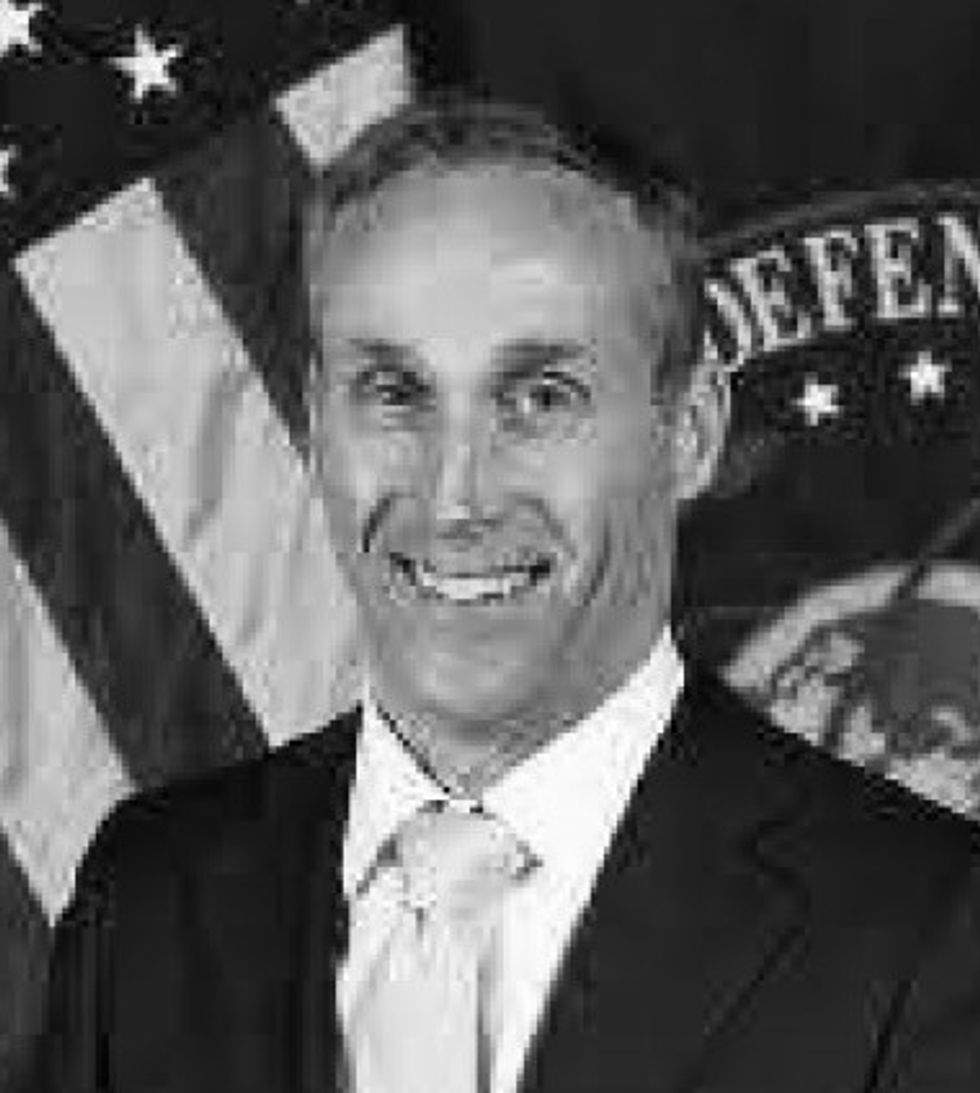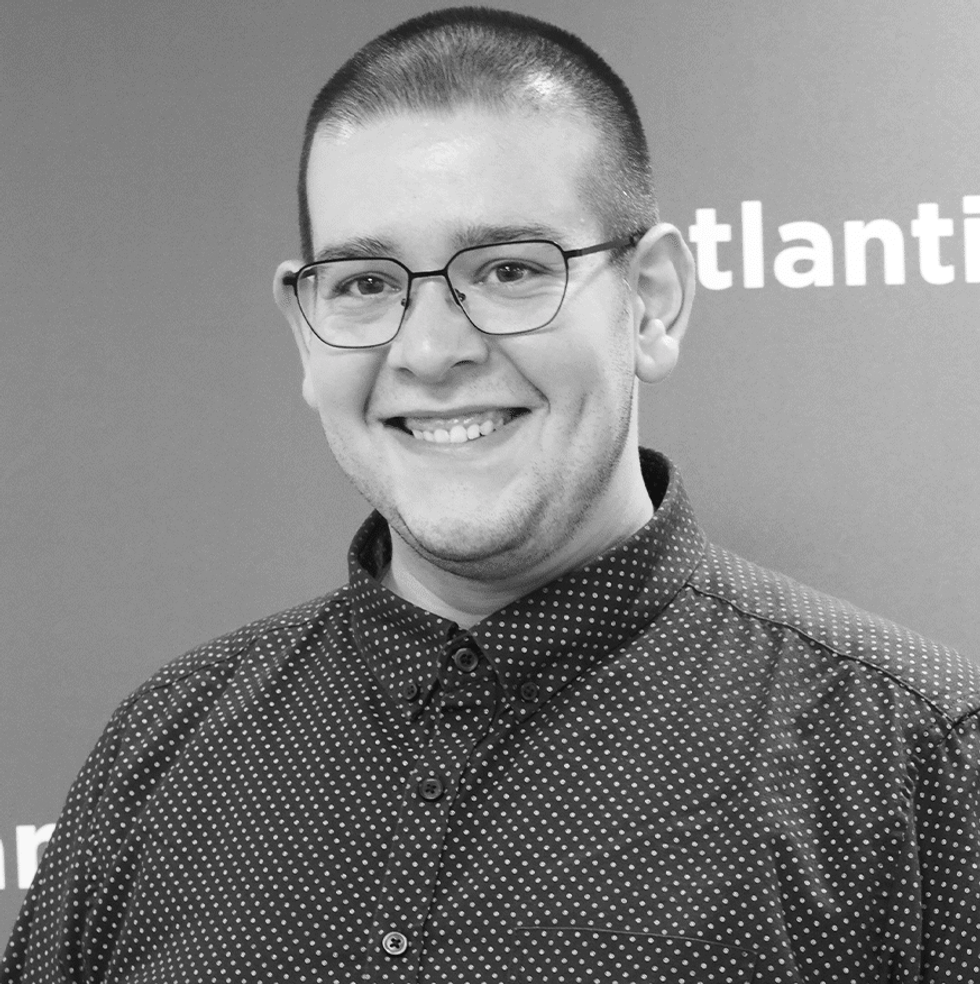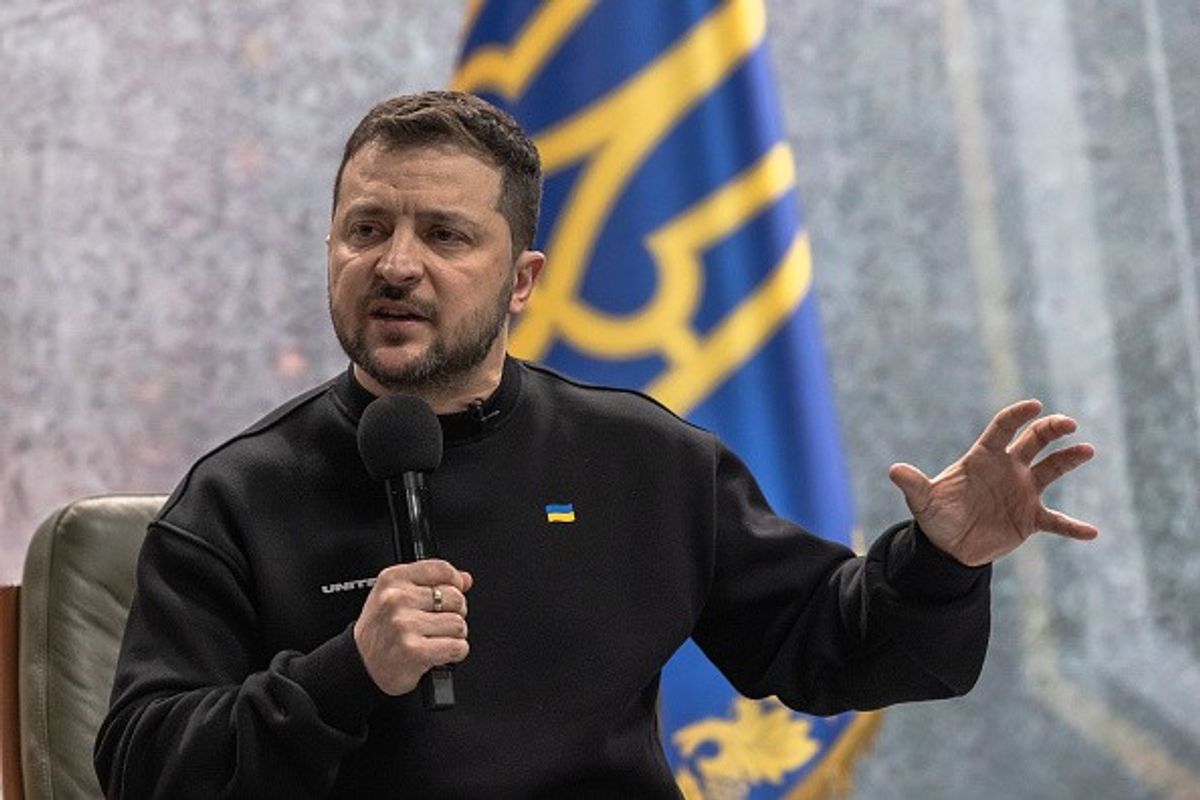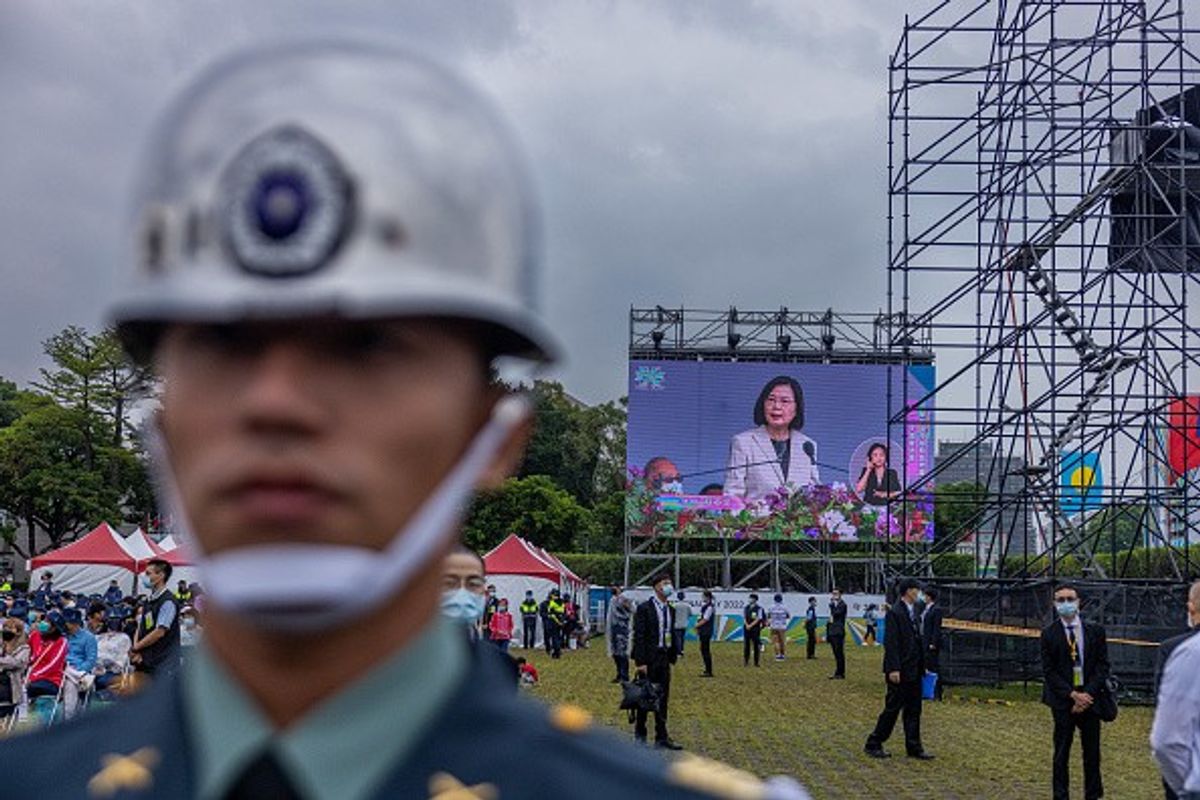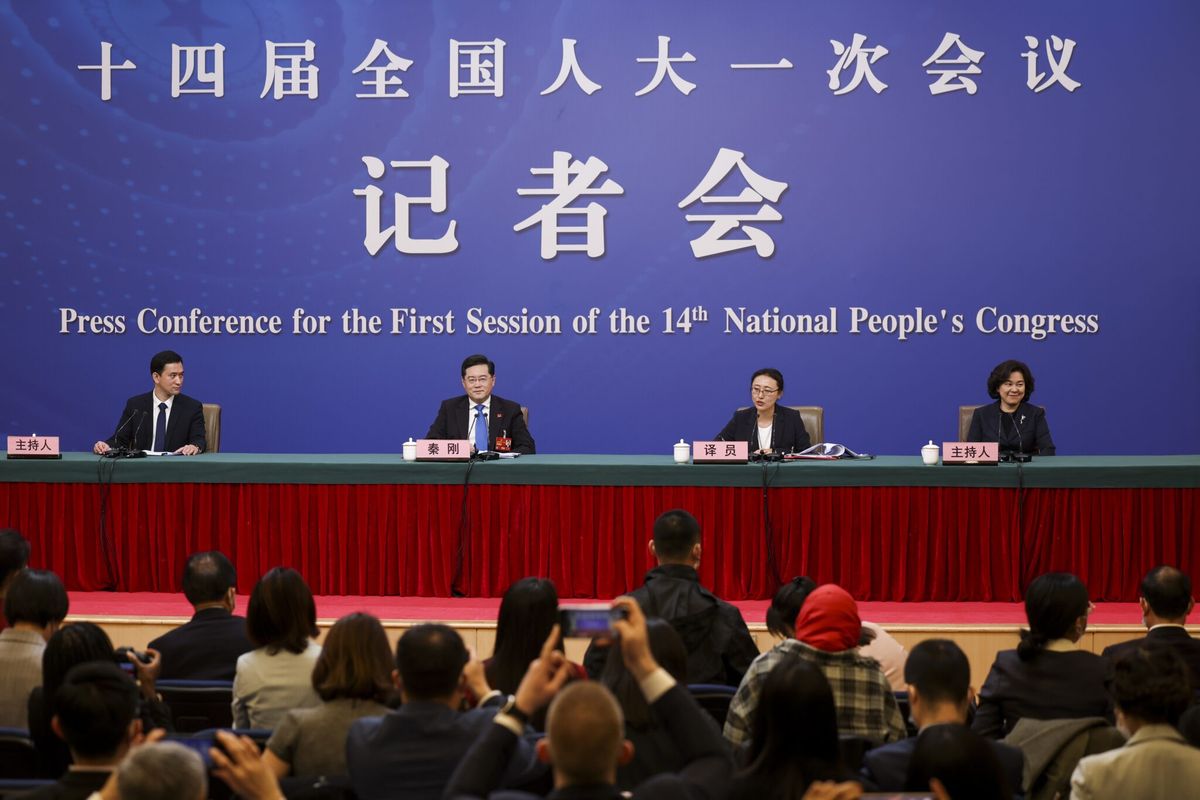BOTTOM LINE UP FRONT: The privately-owned Russian soldier-for-hire group known as the Wagner Group once operated in the shadows but in the past year, it has become an important part of Russia’s war machine in Ukraine. The group's leader Yevgeny Prigozhin is a trusted Kremlin ally but recent comments criticizing Russian defense ministry officials are raising questions about just how much influence the group and it's owner, actually wield.
Russia’s war in Ukraine has added to the notoriety and mystique of this private military company (PMC). Recently, though, long-simmering tensions between Wagner and Russia’s mainline military have erupted into the open. In an audio message published by his own press service, Prigozhin took Russian military officials to task for withholding weapons and ammunition that he says are desperately needed by Wagner forces on the battlefield.
"It's a fascinating evolution that we're seeing with the Wagner Group right now," Director of Analysis for the Defense Intelligence Agency Dr. Trent Maul told The Cipher Brief during a Subscriber+Member virtual briefing last week.
Dr. Trent Maul, Director of Analysis, Defense Intelligence Agency
Dr. Maul was appointed as the Director for Analysis (DI) in May 2021, leading DIA’s all-source analytic effort across the regional, functional, and S&TI portfolios, producing national Defense Intelligence in support of the National Security Strategy, policymakers, warfighters and defense acquisition executives. He also serves as the Functional Manager for all-source analysis for the Defense Intelligence Enterprise.
"Previously their unique value add was that they had deniability. They were associated but disconnected. You could not prove the Russian state connection to the Wagner Group or at least in supply and condoning a lot of its activities. Now we know that. That's no longer hidden. You can't conceal it. It's very clear and it's activity on the front in Bakhmut is very clear. Prigozhin is a press and glory hound. I would imagine that probably internally, there is friction among Prigozhin and the other generals who are trying to move on this front, and I would imagine it probably even causes consternation within the Kremlin. It is something that they have to use right now, but it's probably causing them some internal angst as to 'you are playing with with fire' and you're trying to control it and they don't know how much it's going to get out of hand. That is just localized in what they've been able to bring in Ukraine."
"All of the activities that we have seen them conduct in Syria and throughout Africa, they continue on abated. In fact, I don't think their missions have slowed down and you only have to look at what we've seen in Mali, how important the solution of Wagner was in having the Malian government actually prefer their presence over the French presence in getting after the jihadist problem there and why? There's no accountability. You have nobody to have to account to with regards to their activities and quite frankly, they have no problem in mixing opposition with actual terrorists as well, and that probably is attractive for certain regimes."
THE CONTEXT
- As a PMC, Wagner Group is a profit-driven, independent mercenary force willing to deploy anywhere at any time for the right price. What distinguishes Wagner Group are its strong, enduring ties to Russian figures with military or criminal pasts. Its founder, Yevgeny Prigozhin, is an ex-con who reportedly built a potent combat force out of a completely unrelated venture – as a preferred caterer of Russian President Vladimir Putin. Wagner’s military leader, Dmitry Utkin, is a former Russian special forces officer with a penchant for Adolf Hitler’s favorite composer – hence, the “Wagner” Group.
- Wagner Group has left its mark in many other conflict zones since its emergence as the occupying “little green men” of Russia’s 2014 annexation of Crimea. Tension-filled locales as varied as Venezuela, Central Africa, and Syria have witnessed Wagner Group exploits, characterized by brutal military tactics and alleged atrocities against opposing forces and civilian populations.
- While combat action dominates its public identity, Wagner Group has branched out in recent years to serve as trainer for certain African state armies and provider of protection services for autocratic leaders. The group also has been involved in propaganda and disinformation campaigns in Africa, seeking to burnish Russia’s image as a dependable partner. In addition, Wagner Group chief Prigozhin recently acknowledged ownership of the notorious Internet Research Agency, a so-called troll farm that among other campaigns included social media interference in the 2016 U.S. presidential election.
- The West’s reaction to Wagner Group has been led by the U.S. declaration of the organization in January as a “transnational criminal group,” which effectively freezes Wagner assets in the United States and blocks U.S. citizens from providing funds, goods, or services to the group. In 2021, the European Union imposed sanctions on Wagner and associated individuals that froze assets in the EU, instituted a travel ban, and prohibited EU citizens persons and entities from providing funds to the group, either directly or indirectly.
- Wagner currently has an estimated 50,000 troops in Ukraine, the vast majority of whom are thought to be former inmates of Russian prisons promised pardons in exchange for combat service. Just how essential Wagner Group is to Russia’s ambitions in Ukraine is a matter of debate, but the PMC has been engaged in some of the most grueling, and gruesome, fighting to date. Prigozhin has claimed that Wagner’s role has been decisive in the fight for Bakhmut. Earlier in the conflict, the group was widely implicated in alleged atrocities against civilians in the city of Bucha. The unfolding Russian offensive will yield further insights into the place, and primacy, of Wagner troops in relation to conventional Russian forces.
- An expanding venture for Wagner Group appears to be information warfare – the use of online and other platforms to influence foreign audiences, and especially to shape domestic Russian attitudes in directions favored by the most militant factions in Moscow’s political circles.
THE EXPERTS
Expert opinions on The Wagner Group range from being 'thugs for hire' to being a critical component of the Russian war machine. Below are four different perspectives on the impact and strengths of the Wagner Group on the battefield in Ukraine and around the world.
Daniel Hoffman, Cipher Brief Expert and former Senior CIA Officer

Dan Hoffman served as a three-time station chief and senior executive Clandestine Services officer at CIA before his retirement. He led large-scale HUMINT (human intelligence) and technical programs and his assignments included the former Soviet Union, Europe, and war zones in the Middle East and South Asia. Hoffman also served as director of the CIA's Middle East and North Africa Division. He is currently a national security analyst with Fox News.
Catrina Doxsee, Associate Director, Transnational Threats Project, CSIS
Catrina Doxsee analyzes international and domestic terrorism and the irregular activities of countries such as Iran, Russia, and China. Outside of CSIS, she is a member of the editorial board for the Irregular Warfare Initiative at the Modern War Institute at West Point.
Ruslan Trad, Resident Fellow for Security Research, Atlantic Council’s Digital Forensic Research Lab
Ruslan Trad focuses on issues in Eurasia and Syria and studies hybrid warfare and mercenary groups. Before joining DFRLab, he worked as a risk analyst, consultant, and freelance journalist. Ruslan is also author and co-author of three books and articles related to the Syrian Civil War, Russian foreign policy, and security.
EXPERT Q&A
The Cipher Brief: What is your assessment of the Wagner Group’s military presence and effectiveness in Ukraine? Is Wagner’s role in Ukraine similar to, or different from, its deployments elsewhere (e.g., Syria, Africa) as a Russian proxy force?
Hoffman: It's one thing to send a bunch of mercenaries to do small action operations in Africa or in the Middle East, but it's quite a different thing to send them out to fight a ground war that's reminiscent of what we saw in World War II, if not World War I.
I think Wagner's been pretty effective doing their mercenary work in Africa, for example, but fighting a conflict against Ukraine, where they're going up against soldiers who are trained at a super high level, I think the results have not been that great for them. Then, they've also used lay prisoners, and those are guys who aren't trained either in the most sophisticated military tactics, and that's a great contrast to Ukraine. That's what you're seeing on the battlefield.
Doxsee: In the early days of the war, Wagner personnel largely performed small-scale, irregular operations at or beyond the front lines. As the group’s involvement expanded, Wagner launched online recruitment campaigns specific to operations in Ukraine, redeployed some troops from other locations such as Libya, and infamously began recruiting from prisons in Russia and other locations in which the group operated. Now, Wagner is operating more or less as an unofficial military unit on the front lines.
Wagner’s current activities in Ukraine are similar to—though much larger and more transparent than—its role as a direct ally and force multiplier for the Russian military in countries such as Syria. In sub-Saharan Africa, Wagner has taken a different approach: the group typically seeks partnerships with states that have weak governance, ongoing security challenges, and rich natural resources. In these countries, Wagner exchanges its services — including military training, combat operations, facilitating arms transfers, intelligence, information operations, and site and personnel security — for a regular salary, access to natural resources, and opportunities to advance Moscow’s geopolitical goals.
Trad: Wagner operates within and never outside the framework of the Russian army and in particular Spetsnaz. In this sense, Wagner is not the typical mercenary company as it is understood in the Western sense today. Rather, Wagner looks like a mercenary company from the 17th century with a touch of the Soviet model developed in recent decades.
Wagner's involvement in Russia's military-diplomatic adventures is significant and has varied over time. Initially, in 2014, Wagner began as something between a well-armed security company (PSC) made up of military veterans and a Spetsnaz unit. Wagner's involvement in the annexation of Crimea is a telling example of how the Kremlin uses units of this type. In Syria, this model is developing — Syria has become the testing ground of the GRU and the Russian army for the use of similar structures.
While in Africa Wagner is more of a support force, providing training and advice to local forces, in Syria Wagner becomes a combat unit taking part in active battles - such as in the Hama region against rebels or against the Islamic State in Palmyra. It is in this context that the GRU and the Kremlin are developing "offshoots" of Wagner such as ISIS Hunters and Turan, which are part of Russia's information operations to influence the local population. Wagner is an important part of this.
It's not just for the President anymore. Are you getting your daily national security briefing? Subscriber+Members have exclusive access to the Open Source Collection Daily Brief, keeping you up to date on global events impacting national security. It pays to be a Subscriber+Member.
The Cipher Brief: Observers have noted ongoing tension between Wagner Group leaders, especially Yevgeny Prigozhin, and some mainline Russian military officials. How would you characterize this relationship and how would you describe Prigozhin’s ties to Russian President Putin and other Kremlin power circles?
Hoffman: Russia had a manpower shortage and they had to rely on these (Wagner Group) guys, and Vladimir Putin made a Faustian bargain with someone who's played a big role in cyber operations through the influence operations run through the Internet Research Agency.
Now, Putin's relying on Prigozhin to increase the numbers in the armed forces. Remember, more and more Russians have fled Russia than Putin has been able to mobilize. That's been a challenge for him. The Faustian part of the bargain is that he's elevated Prigozhin's status in Russian national security to the point where Prigozhin is a rival to Putin's own national security professionals, particularly his Minister of Defense, Shoigu, and Army chief of Staff Gerasimov, who's now responsible for the conduct of the war. They're all feeling a little bit of pressure from Prigozhin, and Putin has long mastered that strategy, or tactic, of just playing off different subordinates against each other. But it carries a risk because Prigozhin might have his sights set on the Kremlin.
Doxsee: Since the invasion of Ukraine last year, Prigozhin has grown closer to Putin, largely at the expense of other oligarchs and military leaders. Wagner’s level of involvement in Ukraine may signify Prigozhin’s interest in pursuing more political power and favor. Moreover, his acknowledgement of his connection to Wagner, as well as the group’s establishment of its first official headquarters in St. Petersburg, may indicate that he feels increasingly secure in his position and relationship with Putin, since private military companies are technically illegal in Russia and such actions highlight the substantial leverage that Putin could hold against him.
In recent months, Prigozhin has publicly feuded with other Russian military leaders, and Wagner is in competition with the Russian military to recruit troops and to secure ammunition and other equipment. These tensions are likely to remain, but as long as Wagner’s involvement in Ukraine remains beneficial to both Putin and Prigozhin, we are unlikely to see Prigozhin abruptly fall from favor.
Trad: Prigozhin never got along with the military because he was an outsider. Prigozhin is an investor recruited by military intelligence and Putin to sponsor Wagner's operations in exchange for mining deals in Africa and Syria. He is part of Putin's entourage, which causes envy among officers, the FSB, and the General Staff. What's more, Prigozhin is a businessman who wants the best for his investments and that means attacking the old generation. We see this repeatedly in Ukraine and his demonstrated arrogance.
Gerasimov and his circle of officers want to put Wagner under direct command, to merge the unit with others to dull Wagner's visibility. For a long time, Wagner was a mythologized structure, even glorified by street culture with the help of the state apparatus. That Prigozhin decided - probably in coordination with military intelligence - to bring Wagner to light is a problem for the Russian military. Competition between the units has always been fierce - even bloody at times - with Wagner having strained relations even with the Rosgvardia. Of course, these circumstances generally affect the capabilities of the Russian military, and this is visible in Ukraine.
The Cipher Brief: How central is the use of proxy forces to Russia’s global military and political strategies? Are PMC’s a principal tool for deepening Russian influence, especially in developing nations?
Hoffman: I think Putin saw the United States using contractors in Iraq and decided he wanted some of his own to just add some throw weight to his military, and to give him a little bit of not-so-plausible deniability when he needed it. That's what he's doing. How important is it? They're losing, they're getting their asses kicked. The Wagner Group isn't going to change that. As I mentioned, Wagner Group can be really effective projecting Russian power in a limited way in Africa, or in the Middle East.
But when they're on the battlefield against Ukraine, it's a different story. Is Wagner valuable? Hell, yeah. Is there a risk? Yes. You're elevating the leader of Wagner to a place where he could potentially challenge Vladimir Putin. Not to the point where Putin is worried about it right now at all, but it might be where Putin decides he's got to bring him in and give him more of an official position in the government. Who knows? Those are all things to be watching for.
Doxsee: While many countries worldwide use PMC's, Russian PMC's like the Wagner Group are unique in their heavy pursuit of Russian geopolitical interests in addition to, and often prioritized over, the tasks that other nations may hire them to complete, therefore serving as a valuable tool of Russian irregular warfare. Wagner serves largely as a force multiplier, allowing Russia to achieve more on the battlefield in places like Ukraine or to accomplish goals in more distant settings like Mali without requiring the use—or expense—of formal Russian troops.
Moreover, PMC's add a layer of deniability to Russian activities, making it more difficult to hold them accountable for their actions both internationally and domestically—for example, in prosecuting crimes and human rights abuses, or in bearing responsibility toward the families of troops killed or missing in action. For these reasons, Moscow also views PMC troops as more expendable, and they are therefore often used for higher risk tasks.
Trad: The short answer is that Russia has always used and will use such structures. But these groups are only part of a broader effort, the so-called active measures that date long before Putin. Today, the Russian leadership is copying — recycling, you might say — ideas of military ideologues of the 1960s and 1970s such as Yevgeny Messner, which include the use of military proxies as part of hybrid actions in the so-called gray zone. In the long term, the problem will not be the military units themselves, but their "entourage", i.e. the networks of propagandists, specialists, and political technologists that have a much longer-lasting impact on democratic societies.
Cipher Brief Senior Editor Ken Hughes contributed to this report.
This piece was updated to change the placement of comments by Dr. Maul.
Read more expert-driven national security insights, perspective and analysis in The Cipher Brief





